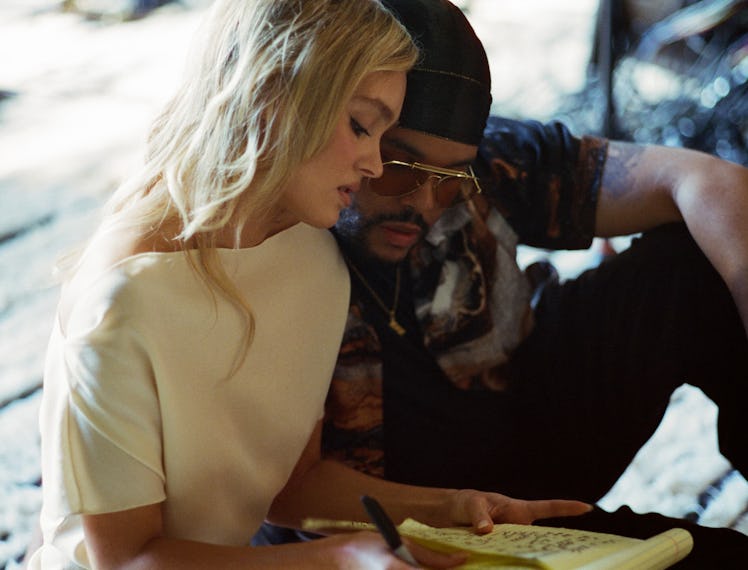Prepare yourself for the discourse: Sam Levinson’s already scandalous TV series, The Idol had its world premiere at Cannes on Monday night, and the first reviews confirm that the show will spark as much, if not more conversation than his first series, Euphoria.
In case you haven’t heard, The Idol tells “the sleaziest love story in all of Hollywood,” with Abel (formerly “The Weeknd”) Tesfaye playing a master manipulator cum cult leader who pulls faltering pop star Jocelyn (Lily-Rose Depp) deep into his nefarious orbit. Since it was first announced, the project has been mired in controversy, culminating in a March Rolling Stone report alleging a toxic workplace and a series that was turning into “sexual torture porn.” As an anonymous production source told RS, “It was a show about a woman who was finding herself sexually, turned into a show about a man who gets to abuse this woman and she loves it.” Both Depp and Tesfaye have since disputed these claims.
Now that a handful of critics at Cannes have seen the first two episodes of the series, which hits HBO Max on June 4th, what’s the consensus? So far, the show has debuted on Rotten Tomatoes with a score of 17%, and reviews from critics are mixed but mostly skeptical, with praise for the performances and less so for the writing. At Variety, Peter Debruge writes “the script...seems calculated to fool audiences into thinking they’re observing how Hollywood operates, when so much of it amounts to tawdry clichés lifted from Sidney Sheldon novels and softcore porn. Showgirls at least was a thinly veiled All About Eve remake, whereas The Idol plays like a sordid male fantasy.”
Debruge adds, “The more [Tesfaye’s Tedros] emerges as an influence on Jocelyn in the episodes ahead, the less room there is for The Idol to pretend that it’s celebrating this imperiled singer’s autonomy — as an artist or as a woman. ‘Pop music’s like the ultimate Trojan horse,’ Tedros tells her, and the same could be said for zeitgeist-shaking TV series: They can be a delivery device for subversive social critique. Trouble is, Levinson’s worldview seems corrupt. It shouldn’t take degradation and suffering to make Jocelyn stronger. Euphoria audiences won’t be too surprised by the shameful way he treats Depp’s character, as both she and the show appear trapped under The Weeknd’s thumb.”
Over at Deadline, Damon Wise writes, “Until we know more, it’s hard to make value judgments about morality and ethics, or, more substantively, the arguments about the male gaze and female body rights that are coming in the water like a stealth torpedo. However it turns out, Depp is quite rivetingly game with, to put it mildly, a highly sexualized performance that also is grounded and often vulnerable, discomfortingly addressing the fine lines between porn and art, power and exploitation that have faced young women in the music industry for years.”
One of the few female critics to review The Idol, Therese Lacson at Collider, had a more straightforward take: “[S]cenes, like one where Tedros orders Jocelyn around with awkward dirty talk, feel like they've been written by a 15-year-old boy. It's fantasy, but a hardly inspired one... What Levinson perceives as provocative and subversive is rather underwhelming. How can a show with so much nudity, sex, and eroticism be so bland? There's no substance behind his style. Perhaps more will arise in later episodes as we learn more about Tedros, but simply showing a wealth of nudity or sex is not enough. Levinson's style is fully on display, and sometimes it works, but whether by design or through a fault of editing, the episodes are messy. A show about a pop star slowly falling apart should be ratcheting up the tension inherent to the plot.”
Giving the show a D rating, Lacson adds: “Depp is decent as Jocelyn, though the role is not exactly the most challenging part to play. Much of her personality and the impression one earns of her is based on her costuming and the way the camera ogles her. It sexualizes her, obsessing over her curves and her beauty. If there was ever a textbook definition of the male gaze, you need only look at how The Idol sees Jocelyn.”
Richard Lawson at Vanity Fair had a slightly more forgiving view, writing, “It’s telling—deliberately, I’m sure—that in one scene we see Jocelyn watching Basic Instinct, one of the crowning jewels of the erotic thriller boom of the last century. Maybe that’s all we’re really being served: a tawdry tale of sex gone scary, dressed up in the visual vernacular of TV’s wunderkind du jour. Though, the show seems to take itself pretty seriously.
“Just don’t approach the first two episodes with any notion that you are about to see something startling and transgressive. Maybe that stuff is coming in later episodes, but thus far, The Idol is way too Top 40 to rattle the squares,” he concludes.
This article was originally published on
